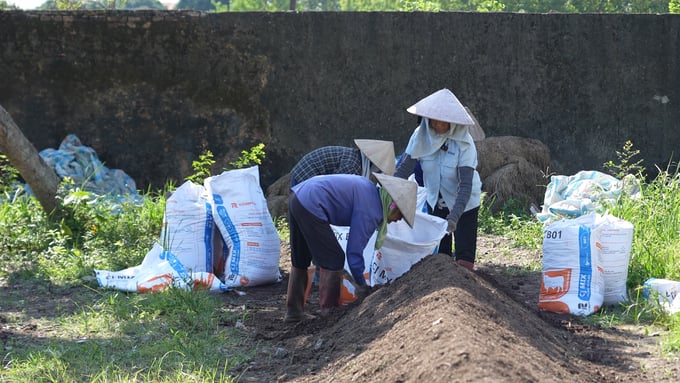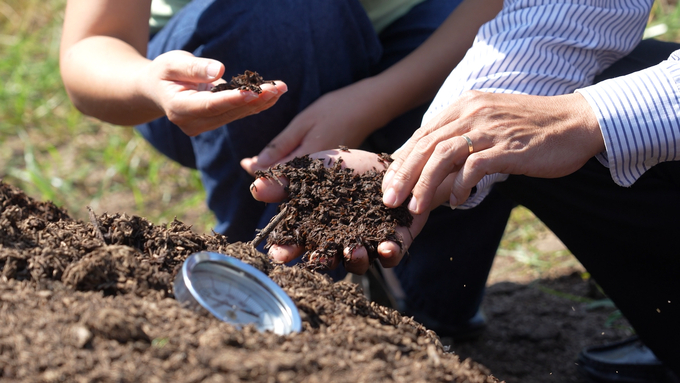June 1, 2025 | 18:04 GMT +7
June 1, 2025 | 18:04 GMT +7
Hotline: 0913.378.918
June 1, 2025 | 18:04 GMT +7
Hotline: 0913.378.918
The “Correct Fertilizer Usage” project is part of the Global Fertilizer Challenge, an initiative by the U.S. Department of State led and funded by the Foreign Agricultural Service under the U.S. Department of Agriculture (USDA).
The Department of Plant Protection (Ministry of Agriculture and Rural Development) is the owner of the “Correct Fertilizer Usage” project in Vietnam. Additionally, the International Rice Research Institute is responsible for implementing the project over the course of four years.
As part of the project, farmers will receive training on techniques to repurpose rice straw and agricultural byproducts into organic fertilizers. Consequently, this initiative allows rural households to save on costs and labor, increase profits, and protect the environment.

After the composting process is complete, farmers pack the organic fertilizer into bags and apply it directly to their fields. Photo: Duc Minh.
The project has been implemented at the Nam Cuong Trading and Services Cooperative (Nam Cuong Cooperative) in Yen Cuong Commune, Y Yen District, Nam Dinh Province since August 2024. After over two months of operation, the project has yielded promising initial results.
According to Nguyen Van Du, Chairman of Nam Cuong Trading and Services Cooperative, local households that utilized IRRI's technology—composting rice straw with a manual mixing machine—achieve a yield of 138 to 300 cubic meters of straw per harvest. Notably, farmers reported a composting time of approximately 45 days, which is half the time required for traditional composting methods (manual or loader-based composting).
Additionally, the project provided local households with mixing equipment and technical guidance, significantly reducing labor needs. Typically, a minimum of 10 workers is required to mix fertilizer manually; with the introduction of the project, only a single worker is needed to operate the machine.
Nguyen Thi Ngan, a member of Nam Cuong Cooperative, noted that the direct application of phosphate and manure is less effective compared to the project's organic fertilizer composting and mixing process.

The organic fertilizer developed a coffee-brown hue and no longer emanates any odor after 2.5 months of composting. Photo: Duc Minh.
Nguyen Thi Ngan previously purchased phosphate, nitrogen, and potassium fertilizers to feed her crops, which resulted in substantial input costs. After receiving training from Nam Cuong Cooperative and IRRI on the new organic composting process, her family repurposed straw and livestock byproducts into fertilizer, cutting costs and boosting profitability considerably.
“Vegetables fertilized with the project’s organic compost are greener, taste sweeter, and pest levels have dropped significantly. Excessive use of chemical fertilizers can harden the soil. However, the effectiveness of organic fertilizer becomes more apparent the more we use, which has motivated local farmers even further,” Ngan added.
According to Tran Ngoc Mai, an IRRI officer, Vietnam faces significant soil degradation and depletion issues. As a result, correct and responsible fertilizer usage is key to restoring soil health.
“When farmers recognize the benefits on crops and soil, they will be encouraged to expand these practices to their communities and neighboring provinces,” Tran Ngoc Mai emphasized.
Hoang Duc Han, Head of Crop Production at the Nam Dinh Province's Department of Crop Production and Plant Protection, noted that the province is committed to developing clean and organic farming models. Furthermore, it currently promotes the use of organic fertilizer through various training sessions. Accordingly, these programs aim to raise farmers’ awareness regarding fertilizers and increase their adoption of straw and byproduct composting practices.
“Through various collaboration activities with IRRI, Nam Dinh’s farmers will have the opportunity to improve incomes and protect the environment. We hope that, following Yen Cuong, many other communes in the province will be able to produce organic fertilizer from straw and other agricultural byproducts,” Hoang Duc Han noted.
Praising straw recycling as “an excellent model,” Hoang Duc Han expressed hope that its success will encourage local farmers to increase organic fertilizer usage, thereby creating a closed-loop system and advancing green, circular agriculture.
The project, scheduled for implementation from 2024 to 2027, will receive support in terms of technical expertise from USDA, IRRI, and Vietnamese scientists. The project's primary beneficiaries encompass all farmers in the project’s designated provinces, who will gain access to advanced technologies and precision farming practices. Ultimately, it aims to optimize the use of agricultural inputs, including rice fertilizer, and expand successful models across the country.
Translated by Nguyen Hai Long

(VAN) Several scientists and farmers are experimenting with soil treatment in some key durian-growing regions such as Cai Lay (Tien Giang), Dak Song, Gia Nghia, and Dak R’lap (Dak Nong).
/2025/05/25/4127-3-073637_820.jpg)
(VAN) Thanks to the promotion from an FAO-implemented project, vegetable production in greenhouses in Moc Chau has seen strong development, from 1.5 hectares in 2021 to nearly 50 hectares in 2024.

(VAN) FAO has recently supported USD 140,000 to implement the project 'Risk mitigation human-animal interface risks through disease control initiatives in pig farming.'

(VAN) The People's Committee of Tra Vinh province has approved an adjustment to the investment policy for the Green Hydrogen Plant project, increasing its area to approximately 52.76 hectares.
![Reducing emissions from rice fields: [2] Farmers’ commitment to the soil](https://t.ex-cdn.com/nongnghiepmoitruong.vn/608w/files/news/2025/05/05/dsc08881jpg-nongnghiep-140632.jpg)
(VAN) Clean rice cultivation model in Thuong Tan commune, Bac Tan Uyen district, is assisting local residents in achieving sustainable agriculture by substantially reducing costs, increasing productivity, and protecting the environment.

(VAN) At the conference to disseminate Resolution No. 68, AgriS introduced its digital agricultural ecosystem and reaffirmed its commitment to accompanying the Government in promoting private sector development and sustainable agriculture.

(VAN) 'Blue Ocean - Blue Foods' initiative is designed to restore marine ecosystems and establish sustainable livelihoods for local communities by cultivating a minimum of 1,000 hectares of cottonii seaweed in the first three years.